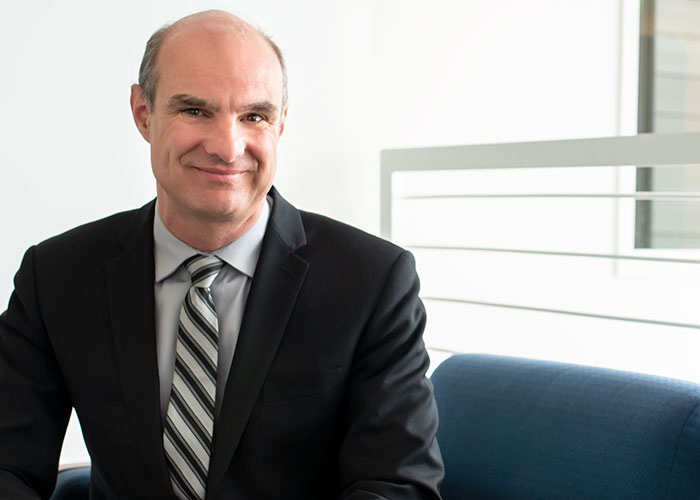A chat with Federico Pasin
The new Director shares his vision
September 4, 2019

Federico Pasin started his first term as Director of HEC Montréal on June 1 of this year. The following are some excerpts from an interview with him as students headed back to class, in which he discussed some of the principles and values that will guide him in his new duties.
Question: You have already said that you favour a holistic approach to management. Tell us about this approach and what it means for you.
Federico Pasin: I have the impression that we’re moving into a world where management is part of everything. It’s present in all professional spheres where there is teamwork. And for me, a holistic approach means that management must open up. It’s essential if we want to remain relevant and ensure that management isn’t taught elsewhere, in other faculties.
Our School must open up and connect with all kinds of different communities. We have to make sure that engineers, chemists, pharmacists and any other specialists come to us when they feel the need to acquire management skills.
The School must be seen as an institution that’s easy to partner with. I’m very proud, in fact, of our new dual degree (BBA – B.Eng.) with Polytechnique Montréal, which is a direct result of efforts in this regard.
At the same time, we have to make sure our students understand the importance of this openness, as it’s a two-way street. Training managers must be about much more than courses like finance, accounting and math. A good manager is extremely well balanced – someone who is cultivated, speaks several languages and has a grounding in psychology. Managers must be at ease directing or working with people more skilled than they are in specific fields.
Q: This fall you’re launching a strategic planning process. What are some of the values you care about and that inform this exercise?
F.P.: It has always been important for me to work in an environment where I feel comfortable, and where I want to interact with others.
So it’s essential for me to create a climate where people feel free to propose new ideas, make suggestions and discuss major issues. Where they can even sometimes disagree, say that something isn’t working or needs to be changed.
I think that a good manager must be able to broach very sensitive and difficult topics very calmly. It’s all about the ability to show compassion, to quickly see that someone is uncomfortable in the group and to take steps to make sure that person feels included and at ease.
Transparency is another value that I consider essential, especially in a teaching and research setting. People don’t want to be told what to think; they want to have some input. But when a manager has to make a decision, for efficiency’s sake, he or she has to ensure that the team members understand the reasons for that decision.
I also want to emphasize how important diversity is to me. I grew up in a household with an Italian father and a Quebec-born mother of Irish stock. That made me very open. I quickly grasped that in life there is not necessarily a single best approach or a single best way to act. There are different ways that vary from one culture to another.
The fact that there are many different perspectives in a given situation doesn’t bother me. On the contrary, it piques my curiosity. I find it interesting.
Q: There are many new faces on the Executive Committee. Generally speaking, how will these new allies help you accomplish your goals?
F.P.: I am someone who places confidence in my allies and gives them plenty of freedom in their respective fields. So I made an effort to surround myself with credible, competent people. I also sought a certain diversity in terms of their age and sex, to achieve a better balance in that regard.
Then I chose people whose views may differ from mine, but who really share my values. By that I mean people who are very respectful of others, for whom transparency and the human dimension are natural, and who are real consensus builders.
These new allies will allow us to pursue our primary goal, that of excelling in research and teaching.
And as much as the School has to stand out on the international scene, it also needs to be connected to the needs of our local community, by remaining relevant and inspiring.
One example is the entrePrism program, which supports immigrants looking to launch a business. It makes me proud of the impact we have on our community.
The members of the Executive Committee are all people whose past or present achievements show that they possess this ability to carry out inspiring projects. They are people who will innovate and take the School to a whole new level. I have great confidence in this team.
